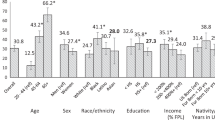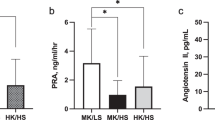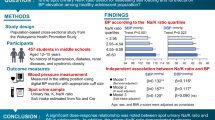Abstract
The objective of this study was to examine associations of blood pressure (BP) with ratios of overnight to 24-h urinary excretion of sodium, potassium, and water. Each of 125 men 27–64 years of age, not taking diuretics, had BP measured during the day on a Monday. Beginning Monday evening, each participant provided three carefully timed 24-h urine collections, divided into daytime and overnight (bedtime to awakening) specimens. Proportion of total 24-h excretion of sodium, potassium, and water in the overnight specimen, standardised for creatinine excretion, was determined for each 24-h period. Associations of systolic and diastolic BP (SBP/DBP) with these proportions were examined with control for age, body mass index, alcohol intake, and heart rate. Mean BP was 116/71 mm Hg; 15 men were on non-diuretic anti-hypertensive therapy. Mean 24-h urinary excretion was 168 mmol for sodium, 68 mmol for potassium, and 16 mmol for creatinine. Mean overnight to 24-h proportions averaged over the 3 days were 30.7% for sodium, 22.0% for potassium, 32.1% for urinary volume, and 33.2% for creatinine. Partial correlations of SBP and DBP with the 3-day averages were 0.257 (P < 0.01) and 0.210 (P < 0.05) for sodium; 0.223 (P < 0.05) and 0.222 (P < 0.05) for potassium; 0.127 and 0.091 for urinary volume; and −0.033 and 0.014 for creatinine. correlations for sodium proportions were larger for the first 24-h period, compared to the second or third 24-h period. these results indicate that higher bp was associated with a relatively greater proportion of sodium and potassium excretion at night. further work is needed to clarify temporal sequence, ie, whether a relatively greater sodium and potassium excretion at night is a risk factor for higher bp (eg, via renal mechanisms), or whether higher bp results in relatively greater sodium and potassium excretion at night, or both.
This is a preview of subscription content, access via your institution
Access options
Subscribe to this journal
Receive 12 digital issues and online access to articles
$119.00 per year
only $9.92 per issue
Buy this article
- Purchase on Springer Link
- Instant access to full article PDF
Prices may be subject to local taxes which are calculated during checkout
Similar content being viewed by others
Author information
Authors and Affiliations
Rights and permissions
About this article
Cite this article
Dyer, A., Martin, G., Burton, W. et al. Blood pressure and diurnal variation in sodium, potassium, and water excretion. J Hum Hypertens 12, 363–371 (1998). https://doi.org/10.1038/sj.jhh.1000601
Received:
Revised:
Accepted:
Published:
Issue Date:
DOI: https://doi.org/10.1038/sj.jhh.1000601
Keywords
This article is cited by
-
Public and occupational health risks related to lead exposure updated according to present-day blood lead levels
Hypertension Research (2023)
-
Reversible dysregulation of renal circadian rhythm in lupus nephritis
Molecular Medicine (2021)
-
Development and double cross-validation of new spot urine sodium equation to predict 24-h urine sodium in the Malaysian population
Journal of Health, Population and Nutrition (2021)
-
Diurnal variation of urinary sodium-to-potassium ratio in free-living Japanese individuals
Hypertension Research (2017)
-
Sodium intake of a city population in Korea estimated by 24-h urine collection method
European Journal of Clinical Nutrition (2013)



